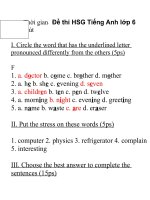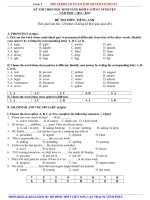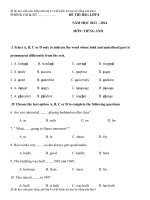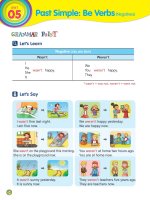LUYỆN CHUYÊN SÂU TIẾNG ANH LỚP 8 - CHỦ ĐỀ: LEISURE ACTIVITIES - Tài liệu chung
Bạn đang xem bản rút gọn của tài liệu. Xem và tải ngay bản đầy đủ của tài liệu tại đây (1.52 MB, 9 trang )
<span class='text_page_counter'>(1)</span><div class='page_container' data-page=1>
A
VOCA BU LARY
New words Meaning Picture Example
addicted
/ d kt d/
(adj)
nghiện (thích)
cái gì
Many teenagers are addicted
to computer games nowadays.
Nhiều thanh thiếu niên ngày
nay nghiện trò chơi điện tử.
adore
/ d (r)/
(v)
yêu thích, mê
thích Jane adores working with
children.
Jane yêu thích làm việc với trẻ
em.
community
centre
/k mju n ti
sent (r)/
trung tâm văn
hóa cộng đồng The locals go to the community
centre every weekend.
Người dân địa phương đi đến
trung tâm văn hóa cộng đồng
mỗi cuối tuần.
cra t
/kr ft/
(n)
đồ thủ công
He invited me to a craft
workshop last week.
Anh ấy mời tôi đến một xưởng
thủ công tuần trước.
DIY
/ di a wa /
đồ tự làm,
tự sửa
My brother is a real DIY
enthusiast.
Anh trai tôi là một người đam
mê đồ tự làm thực sự.
LEISURE ACTIVITIES
(HOẠT ĐỘNG THƯ GIÃN NGHỈ NGƠI)
</div>
<span class='text_page_counter'>(2)</span><div class='page_container' data-page=2>
hang out
/hæ a t/
đi chơi với bạn
bè
I often hang out with friends in
my free time.
Tôi thường đi chơi với bạn vào
thời gian rảnh.
leisure
/ le (r)/
(n)
giải trí
These days we have more
leisure activities than in the
past.
Ngày nay chúng ta có nhiều
hoạt động giải trí hơn ngày xưa.
mind
/ma nd/
(v)
chú ý, để ý
I hope you don’t mind the
noise.
Tôi hi vọng bạn sẽ không để ý
tiếng ồn.
rely on
/r la n/
tin tưởng, tin
cậy vào
You can rely on his judgement.
Bạn có thể tin vào sự phán đốn
của anh ấy.
savings
/ se v z/
(n)
tiền tiết kiệm
He spent all his savings on
buying a new car.
Anh ấy dành hết tiền tiết kiệm
để mua xe mới.
socialise
/ s la z/
(v)
giao tiếp để tạo
mối quan hệ Jim enjoys socialising with
other students.
</div>
<span class='text_page_counter'>(3)</span><div class='page_container' data-page=3>
stranger
/ stre nd (r)/
(n)
người lạ
You shouldn’t reveal your
personal information to
strangers.
Bạn không nên tiết lộ thông tin
cá nhân cho người lạ.
sur
/s f/
(v)
lướt
I spend two hours a day sur ng
the web.
Tôi dành hai tiếng mỗi ngày để
lướt web.
trick
/tr k/
(n)
mẹo
He amazed everyone by a card
trick.
Anh ấy làm mọi người ngạc
nhiên bằng mẹo với lá bài.
virtual
/ v t u l/
(adj)
ảo (chỉ có ở trên
mạng)
The Internet has created a
virtual world for its users.
Internet đã tạo ra một thế giới
ảo cho người dùng của nó.
B
GRAMMAR: CÁC ĐỘNG TỪ DIỄN ĐẠT SỰ YÊU THÍCH (VERBS OF LIKING)
I VERBS O F LIKING
Động từ Nghĩa
Adore Yêu thích, mê mẩn
Love Yêu
</div>
<span class='text_page_counter'>(4)</span><div class='page_container' data-page=4>
Dislike/ don’t like Khơng thích
Hate Ghét
Detest Căm ghét
II VERBS O F LIKING + V_ING/ TO V
- Khi muốn dùng một động từ chỉ một hành động k hác ở sau động từ chỉ sự thích, ta phải sử
dụng danh động từ (V_ing) hoặc động từ nguyên thể có “to” (to V ).
1. Verbs + V-ing/ to V
Những động t ừ đi với cả danh động từ và động từ ngun thể có “to” mà khơng thay đổi
về nghĩa.
Verbs Verbs + V-ing Verbs + to V
Like I like skateboarding in my free time.
(Tớ thích trượt ván trong thời gian rảnh)
I like to skateboard in my free time.
(Tớ thích trượt ván trong thời gian rảnh)
Love She loves training her dog.
(Cơ ấy u thích huấn luyện chú cún cưng)
She loves to train her dog.
(Cô ấy yêu thích huấn luyện chú cún cưng)
Hate He hates eating out.
(Anh ấy ghét đi ăn hàng)
He hates to eat out.
(Anh ấy ghét đi ăn hàng)
Prefer My mother prefers going jogging.
(Mẹ tơi thích đi bộ hơn.)
My mother prefers to go jogging.
(Mẹ tơi thích đi bộ hơn.)
2. Verbs + V-ing
Những động từ chỉ đi với danh động từ.
Verbs Verbs + V-ing
adore They adore eating ice cream.
(Họ cực thích ăn kem.)
enjoy We enjoy playing basketball.
(Chúng tơi thích chơi bóng rổ.)
fancy Do you fancy making crafts?
(Cậu thích làm đồ thủ cơng khơng?)
don’t mind I don’t mind cooking.
</div>
<span class='text_page_counter'>(5)</span><div class='page_container' data-page=5>
dislike Does he dislike swimming?
(Có phải anh ấy khơng thích bơi lội khơng?)
detest I detest doing housework.
(Tôi cực ghét làm việc nhà.)
BÀI TẬP VẬ N DỤ NG CƠ BẢN
Bài 1:
Hoàn thành những c âu sau, sử dụng dạng nguyên thể có
“to”(to V ) của động từ
trong ngoặc.
1. Ever yone likes (eat) __________ ice cream.
2. Do you prefer (read) __________ books in your free time?
3. I hate (watch) __________ horror movies.
4. Many people prefer (go) __________ travelling on holidays.
5. My father loves (play) __________ golf with his friends.
6. I prefer (not stay) __________ up too late.
7. What does your sister love (do) __________ in her spare time?
8. I used to prefer (hang out) __________ with my friends at weekend.
9. I think not many people like (listen) __________ to her music.
10. Teenagers love (surf ) __________ the web to while away their time.
Bài 2:
Hoàn thành những câu sau với dạng danh động từ (V-ing) của các động từ trong ngoặc.
1. My mother dislikes (prepare) __________ the meals.
2. Do you enjoy (do) __________ DIY in your free time?
3. I detest (have) __________ a conversation with John.
4. Do you think Jane prefers (not socialise) __________ with other students?
5. I don’t mind (explain) __________ the problem again.
6. Ann fancies (listen) __________ to songs of her favorite singer.
7. My friend adores (spend) __________ time with her cats.
8. I always love (try) __________ new things when I go travelling.
</div>
<span class='text_page_counter'>(6)</span><div class='page_container' data-page=6>
Bài 3:
Điền dạng thích hợp của động từ trong ngoặc để hoàn thành các c âu sau:
1. Did you enjoy (watch) __________ the comedy last night?
2. Many people prefer (do) __________ gardening after their retirement.
3. My cat dislikes (sleep) __________ on the oor.
4. My father doesn’t mind (work) __________ hard.
5. My cousin doesn’t like (study) __________ Math and Chemistry.
6. They dislike (talk) __________ with each other.
7. Jim and Jane don’t fancy (go) __________out tomorrow.
8. Did you hate (eat) __________ vegetables when you was small?
9. She didn’t prefer (tell) __________ him about her plan.
10. James enjoys (have) __________ dinner in a luxury restaurant.
11. I hope my mother will enjoy (spend) __________ time with her grandchildren.
12. Some people enjoy (take) __________ a shower in the morning.
13. I think your brother won’t mind (lend) __________ you a helping hand
14. My boyfriend dislikes (wait) __________.
15. What do you detest (do) __________ the most?
Bài 4:
Dựa vào các từ cho sẵn, viết thành c âu hoàn chỉnh.
1. Peter/ prefer/ play/ computer games/ in his free time.
________________________________________________________________
2. You/ hate/ do/ the washing?
________________________________________________________________
3. My father/ enjoy/ play/ sports/ and/ read/ books.
________________________________________________________________
4. The teacher/ not/ mind/ help/ you/ with di cult exercises.
________________________________________________________________
5. Jane/ not/ fancy/ read/ science books.
</div>
<span class='text_page_counter'>(7)</span><div class='page_container' data-page=7>
6. Which kind of juice/ you/ dislike/ drink/ the most?
________________________________________________________________
7. Ann/ fancy/ do/ DIY/ in her spare time.
________________________________________________________________
8. My father/ prefer/ not/ eat/ out.
________________________________________________________________
9. Ms. Smith/ love/ go/ shopping/ at weekends.
________________________________________________________________
10. Ever yone/ adore/ receive/ presents/ on their bir thday.
________________________________________________________________
BÀI TẬP VẬ N DỤ NG NÂ NG CAO
Bài 5:
Đánh dấu [√] trước câu đúng, đánh dấu [X] trước câu sai và sửa lại cho đúng.
______
1. My sister doesn’t mind to look after my cat.
________________________________________________________________
______
2. Jim dislikes going to the librar y because he likes reading books.
________________________________________________________________
______
3. I prefer to not go out today.
________________________________________________________________
______
4. I used to like watching cartoons on TV.
________________________________________________________________
______
5. Does Mrs. Smith enjoy to cook?
________________________________________________________________
______
6. Mary hates doing the housework and take after her baby sister.
________________________________________________________________
______
7. In my free time, I love to do DIY with my sister.
</div>
<span class='text_page_counter'>(8)</span><div class='page_container' data-page=8>
______
8. Josh detests to socialise with his co-workers.
________________________________________________________________
______
9. Which movie does he fancy to watch?
________________________________________________________________
______
10. I prefer hanging out with friends to playing computer games.
________________________________________________________________
Bài 6:
Điền dạng đúng của các động từ cho sẵn vào chỗ trống sao cho hợp lý.
socialise detest sur f write
rely read adore hang out
1. My brother likes __________ the Internet looking for new music.
2. I dislike __________ too much on other people. I want to be independent.
3. Josh enjoys __________ with his classmates after school.
4. My sister and I fancy __________ novels when we have free time.
5. He’s very artistic. He enjoys __________ poems in his free time.
6. James _________ talking with his neighbors because he nds them annoying.
7. My uncle loves __________ with other people. He has many friends.
8. Ann __________ work ing with children. She’s a teacher.
Bài 7:
Khoanh tròn vào đáp án đúng.
Nowadays, leisure activities are totally di erent from the past. Many people no longer enjoy
(1) ____ in outdoor activities after school. Instead, they (2) ____ playing computer games or
(3) ____ the web in their free time. Some people (4) ____ too much on computer and the Internet.
For example, they prefer (5) ____ messages to having a face-to-face conversation with their friends.
Even when people (6) ____ out with their friends, they rarely talk but they use their phones to surf
web. However, many people dislike the Internet and the (7) ____ world. They hate to waste time
on the computer and (8) ____ other activities such as reading, shopping or spor ting.
1.
A. par ticipate B. to participate C. participating D. participates2.
A. fancy B. don’t mind C. dislike D. hate3.
A. sailing B. sur ng C. swimming D. diving</div>
<span class='text_page_counter'>(9)</span><div class='page_container' data-page=9>
5.
A. send B. to send C. to sending D. sends6.
A. play B. rely C. meet D. hang7.
A. vir tual B. real C. fake D. new8.
A. dislike B. detest C. enjoy D. mindBài 8:
Đọc đoạn văn sau và điền T (True) trước câu đúng với nội dung bài đọc, điền F (False)
trước câu không đúng với nội dung bài đọc.
LEISURE ACTIVITIES IN BRITAIN
The weekends are a time for many leisure activities in Britain. British people often have to work
ve days a week from Monday to Friday so weekend is the precious time for family and friends.
People enjoy various indoor and outdoor activities in Britain. According to the EU’s statistical
o ce, British people spend about 45% of their free time watching television, 24% of their free
time socializing, 22-23% on sport and hobbies, and 10% on other activities. Other popular leisure
activities are listening to the radio, listening to pre-recorded music, reading, DIY, gardening, eating
out and going to the cinema.
The most common leisure activity in the UK is watching television. The average viewing time
is 25 hours per person per week. Almost all households have at least one television set. The second
most popular activity in Britain is visiting or entertaining friends or relations. Another popular
leisure activity is gardening. The British are k nown as a nation of gardeners. Most people have a
garden on their propert y. Every town in Britain has one or more DIY centres and garden centres.
These are like supermarkets for the home and garden. These places are ver y popular with British
home-owners at the weekends.
______ 1. People enjoy various indoor activities in Britain.
______ 2. British people spend more than half of their free time watching television.
______ 3. The most common leisure activity in the UK is visiting or entertaining friends or
relations.
______ 4. All households have at least one television set.
______ 5. British people are all gardeners.
</div>
<!--links-->









